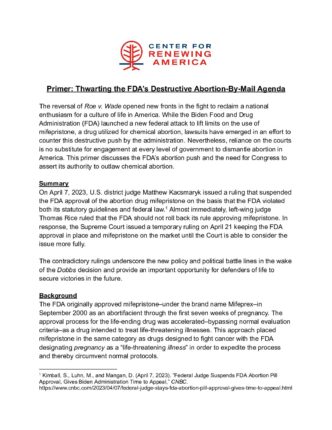
Primer: Thwarting the FDA’s Destructive Abortion-By-Mail Agenda

The reversal of Roe v. Wade opened new fronts in the fight to reclaim a national enthusiasm for a culture of life in America. While the Biden Food and Drug Administration (FDA) launched a new federal attack to lift limits on the use of mifepristone, a drug utilized for chemical abortion, lawsuits have emerged in an effort to counter this destructive push by the administration. Nevertheless, reliance on the courts is no substitute for engagement at every level of government to dismantle abortion in America. This primer discusses the FDA’s abortion push and the need for Congress to assert its authority to outlaw chemical abortion.
Summary
On April 7, 2023, U.S. district judge Matthew Kacsmaryk issued a ruling that suspended the FDA approval of the abortion drug mifepristone on the basis that the FDA violated both its statutory guidelines and federal law.1 Almost immediately, left-wing judge Thomas Rice ruled that the FDA should not roll back its rule approving mifepristone. In response, the Supreme Court issued a temporary ruling on April 21 keeping the FDA approval in place and mifepristone on the market until the Court is able to consider the issue more fully.
The contradictory rulings underscore the new policy and political battle lines in the wake of the Dobbs decision and provide an important opportunity for defenders of life to secure victories in the future.
Background
The FDA originally approved mifepristone–under the brand name Mifeprex–in September 2000 as an abortifacient through the first seven weeks of pregnancy. The approval process for the life-ending drug was accelerated–bypassing normal evaluation criteria–as a drug intended to treat life-threatening illnesses. This approach placed mifepristone in the same category as drugs designed to fight cancer with the FDA designating pregnancy as a “life-threatening illness” in order to expedite the process and thereby circumvent normal protocols.
In 2002, a lawsuit was filed by two groups challenging the FDA’s approval of Mifeprex.2 The regulatory guidelines require the FDA to respond to a challenge within 180 days. Instead, the agency flagrantly violated the regulatory petition process and ignored the challenge for almost 15 years until finally dismissing it altogether in March 2016.3
Another challenge was filed in March 2019, which was also summarily ignored for nearly three years. During that timeframe, the FDA announced in April 2021 that it was greenlighting the dispensing of mifepristone through mail and mail-order pharmacies.4 This decision seemingly violated the Comstock Act–a 19th Century law that forbids sending or receiving anything by mail to facilitate an abortion.5 The plain text of the Comstock Act was reinterpreted to argue that the Act’s prohibitions only apply when the sender intends for the recipient to obtain an illegal abortion.6
Following the Dobbs decision in June 2022, which finally struck down the legally-flawed and unconstitutional Roe v. Wade, a lawsuit was filed against the FDA arguing that the agency’s regulatory malfeasance with regard to approving mifepristone was “arbitrary and capricious.” The lawsuit alleged that the FDA had violated the Administrative Procedures Act throughout the approval process of mifepristone and had done so without adhering to safe and effective standards to determine the drug’s impact on minors.7
Some of the evidence behind the lawsuit includes the FDA watering down safety restrictions. Initially, these safety measures included three in-person physician visits required for administering mifepristone, dispensing the drug by a licensed physician, and mandatory reporting of all medical complications. The FDA subsequently lowered the restrictions in 2016 and 2021 to just one in-person visit, allowing non-doctors to dispense it, removing mandatory reporting of all non-fatal complications, and expanding mifepristone’s use from 7 weeks to 10 weeks.8
Plaintiffs argued that the drug also poses the risk of severe bleeding complications that is nearly three times higher than surgical abortion procedures.9 As such, the plaintiffs requested the FDA’s approval of Mifeprex and the subsequent diminished safety revisions be put on hold pending litigation.
The lawsuit was filed in the Northern District of Texas before Judge Matthew Kacsmaryk, who issued an order to halt the FDA’s original approval of mifepristone as well as the agency’s subsequent revised safety standards. The ruling allowed one week before it took hold on April 14, 2023, to provide the FDA with sufficient time to appeal the decision.
Following the FDA appeal, a three-judge panel with the Fifth Circuit agreed with Kacsmaryk’s decision that the plaintiffs had legal standing to bring the lawsuit forward, that the plaintiffs properly filed the lawsuit within the defined statute of limitations, and the plaintiffs had rightly exhausted appeals to the FDA while the agency had “plainly and repeatedly refused to follow its own regulations.”10
Importantly, the Fifth Circuit ruled that the FDA had relied on flawed legal reasoning from the Justice Department’s Office of Legal Counsel with regard to its interpretation of the Comstock Act. The FDA safety revisions in 2021 expressly violated this law when the agency approved dispensing of mifepristone by mail.
The Fifth Circuit, therefore, ruled that the original approval process of mifepristone could remain in effect while litigation proceeds, but that the original safety protocols had to be reinstated.
The Supreme Court agreed to hear an emergency request from mifepristone’s manufacturer, Danco Laboratories, to continue producing the drug without the restrictions placed on it by the Fifth Circuit. The Supreme Court ruled on April 21 that mifepristone could remain on the market under the FDA’s existing safety protocols as the case is being litigated.11
It is expected that the case will eventually make its way back to the Supreme Court after working its way through the lower courts.
Policy Implications
The lawsuit underscores the FDA’s woke and dehumanizing posture toward the American people and in particular highlights the extent to which a weaponized agency is willing to violate the law to advance its abortion agenda. Furthermore, the Left’s response to the District Court’s order illustrates the reality that there is no satisfying the pro-abortion industry.
For example, Rep. Alexandria Ocasio-Cortez (D-NY) stated outright that “the Biden administration should ignore this ruling.” She was joined days later by Rep. Nancy Mace (R-S.C.).12 Senator Ron Wyden (D-OR) said in a statement that he believes “the Food and Drug Administration has the authority to ignore this ruling, which is why I’m again calling on President Biden and the FDA to do just that.”13 These high-profile legislators are apparently so extreme in their abortion views that they are willing to embrace nullification to ensure more babies are able to be extinguished in the womb.
While less extreme opponents of Judge Kacsmaryk’s ruling have decried it as a judge “with no scientific expertise…overruling the agency that has a ton of scientific expertise,”14 the reality is that the ruling is predicated on compelling evidence that the FDA:
- Bypassed standard regulatory protocols for the approval of mifepristone in violation of the Administrative Procedures Act (APA);
- Categorized pregnancy as a life-threatening “illness” to justify the expedited approval process;
- Intentionally ignored legitimate appeals from parties with standing with regard to the approval process;
- Revised safety standards without appropriate consideration for its impact on young women; and
- Violated the Comstock Act through a legally-dubious interpretation to justify approval of mifepristone’s dispensation by mail.
The District Court’s stay has nothing to do with a court second-guessing medical expertise and everything to do with bodychecking an agency that clearly violated both the law and rulemaking process. This ruling simply emphasizes the purpose of the courts. Nevertheless, regardless of the outcome of this issue in the courts, it is incumbent that policymakers take decisive steps to put a stop to weaponized federal agencies.
Instead of relying on the courts to outlaw chemical abortions, legislators should act now to reinforce pro-life policies through statute. Among the many actions lawmakers should consider:
- Targeted Congressional Prohibition: Congress has every right to step into the breach to defend the innocent lives of its future citizens. Congress should pass language barring the FDA from issuing any rules, regulations, or guidance that treats pregnancy as an “illness” and prohibits the agency from approving any future drugs that facilitate a chemical abortion. While this won’t explicitly stop pharmaceutical companies from developing such drugs, it will create a major incentive to back away if they know there is no hope of FDA approval.
- Expanded REINS Act for FDA: Given the FDA’s clear and arguably intentional violations of the rulemaking process, Congress has no choice but to rein in a rogue agency putting politics ahead of safety and the law. Congress should pass a version of the REINS Act strictly tailored to the FDA that requires new rules and regulations proposed by the agency to be approved by both the House and Senate before going into effect.
- Appropriations Rider: Congress should marry statutory action with appropriations riders tied to the FDA’s funding stream. This can be done either as an aggressive limitation rider that prohibits any taxpayer funding for the approval of drugs that facilitate a chemical abortion or as a legislative rider that restores previous requirements that mifepristone be dispensed in person and only in certain specified healthcare settings, thereby neutering the abortion-by-mail agenda.
- Congressional Clarification Resolution: While resolutions are nonbinding, at a bare minimum the House should also pass a sense of Congress rebutting the Office of Legal Counsel and unequivocally stating that the Comstock Act means precisely what it says in the plain reading of its text: that no “articles or things” may be sent or received by mail to produce an abortion. Period.
- State Legislative Prohibitions: In the wake of Dobbs and the District Court’s stay on mifepristone, state legislators have the opportunity to continue solidifying sanctuaries for life. State lawmakers should ban the dispensation of mifepristone (and any other chemical abortifacients) altogether–especially in states that have 6-week or full bans.
The FDA’s rogue actions must be held to account through focused legislative action. Indeed, the 2021 decision to dispense the abortion drug through the mail is not only a deliberate violation of longstanding statutes, but also a direct threat to sovereign state laws that prohibit the barbaric practice of abortion.
Perhaps most disturbingly, this entire case illustrates the degree to which the basic tenets of our republic have been–and remain–under assault from corrupt and captured institutions. This is the latest example of a federal agency intentionally working to undermine duly-passed legislation by the people’s elected representatives. Lawmakers should send a clear message that this behavior will not be tolerated.
Conclusion
The District Court’s order to block the FDA’s illegal and weaponized “abortion-by-mail” agenda has opened up an opportunity to rein in a rogue agency in clear violation of duly-enacted laws. Congress should also look to curb the FDA’s rulemaking criteria, bolster the Comstock Act, and prohibit chemical abortions at the federal level. State lawmakers should also prohibit chemical abortion in their states and seek to solidify themselves as sanctuaries for life.
An across-the-board offensive posture to restore a culture of life will force progressives to cede ground as they attempt to weather the blowback from decades of far-left ideological destruction. As conservatives have learned from the all-important Speaker battle in January, a reasoned offensive posture creates the necessary political conditions to enact policies that will bear fruit for future generations and restore healthy communities rooted in life, virtue, and freedom.
Endnotes
1. Kimball, S., Luhn, M., and Mangan, D. (April 7, 2023). “Federal Judge Suspends FDA Abortion Pill Approval, Gives Biden Administration Time to Appeal,” CNBC. https://www.cnbc.com/2023/04/07/federal-judge-stays-fda-abortion-pill-approval-gives-time-to-appeal.html
2. Citizen Petition; Harrison, D. (August 2002). “Request for Stay and Repeal of the Approval of Mifeprex for the Medical Termination of Intrauterine Pregnancy Through 49 Days’ Gestation,” Food and Drug Administration Regulatory Appeal. https://aaplog.org/wp-content/uploads/2021/01/2002-Aug-Citizen-Petition_Mifeprex-8.20.02.pdf
3. Savas, L. (April 10, 2023). “The Abortion Pill’s Two-Decade Journey to Court,” WORLD News Group. https://wng.org/roundups/the-abortion-pills-two-decade-journey-to-court-1681163866
4. Perrone, M. (January 3, 2023). “FDA Finalizes Rule Change Allowing Mail-Order Abortion Pills,” PBS. https://www.pbs.org/newshour/politics/fda-finalizes-rule-change-allowing-mail-order-abortion-pills
5. Klibanoff, E. (March 20, 2023). “How An Old Law Found New Life in Lawsuit Seeking to Revoke Approval of Abortion Pill,” The Texas Tribune. https://www.texastribune.org/2023/03/20/texas-fda-abortion-pill-comstock-act/
6. U.S. Department of Justice (December 23, 2022). “Application of the Comstock Act to the Mailing of Prescription Drugs That Can Be Used for Abortions,” Office of Legal Counsel. https://www.justice.gov/olc/opinion/file/1560596/download
7. U.S. District Judge Matthew Kacsmaryk (April 7, 2023). “Alliance for Hippocratic Medicine et. al v. U.S. Food and Drug Administration,” https://www.politico.com/f/?id=00000187-5e3d-d1c2-abc7-7e3d635a0000
8. Tavernise, S. (March 30, 2016). “New F.D.A. Guidelines Ease Access to Abortion Pill,” The New York Times. https://www.nytimes.com/2016/03/31/health/abortion-pill-mifeprex-ru-486-fda.html
9. Ninimaki, M. et al (October 2009). “Immediate Complications After Medical Compared with Surgical Termination of Pregnancy,” Obstetrics & Gynecology. https://journals.lww.com/greenjournal/Abstract/2009/10000/Immediate_Complications_After_Medical_Compared.14.aspx
10. Whelan, E. (April 13, 2023). “Fifth Circuit Grants FDA Partial Stay of Abortion-Pill Ruling,” National Review Online. https://www.nationalreview.com/bench-memos/fifth-circuit-grants-fda-partial-stay-of-abortion-pill-ruling/#:~:text=In%20a%2042%2Dpage%20opinion,of%20the%20abortion%20drug%20mifepristone.
11. Kusisto, L. (April 21, 2023). “Supreme Court Allows Abortion Pill Mifepristone to Stay on the Market,” The Wall Street Journal. https://www.wsj.com/articles/supreme-court-faces-fresh-deadline-in-abortion-pill-case-6d7b9049
12. Chen, S. (April 10, 2023). “GOP Rep. Mace Joins AOC in Urging FDA to “Ignore” Abortion Pill Freeze,” Axios. https://www.axios.com/2023/04/10/abortion-pills-ruling-mace-aoc
13. Senator Ron Wyden (April 7, 2023). “Wyden to President Biden and FDA After Texas Ruling: Ignore Any Ban, Keep Mifepristone on the Market,” Sen. Wyden Press Release. https://www.wyden.senate.gov/news/press-releases/wyden-to-president-biden-and-fda-after-texas-ruling-ignore-any-ban-keep-mifepristone-on-the-market14. Klibanoff, E. (April 7, 2023). “Federal Judge in Texas Suspends FDA Approval of Abortion Pill,” The Texas Tribune. https://www.texastribune.org/2023/04/07/texas-abortion-drugs-fda-ruling/




